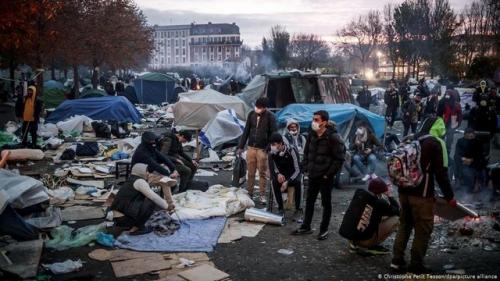France grants citizenship to immigrant essential workers
The new move comes at a time of increasing popular criticism of the government, including protest of two impending laws seen to curtail civil rights.
- Opinión

The government of France has decided to recognize the contributions of essential workers from other countries working within its borders during the pandemic by offering them French citizenship. On 22 December 2020, the day of the announcement, 74 immigrants were naturalized and 693 were in line to receive their papers. So far, 2890 requests have been received.
“Health professionals, cleaning women, childcare workers, cashiers, etc., have proven their commitment to the nation. It is now up to the Republic to take a step in their direction,” reads the government’s press release.
The new move comes at a time of increasing popular criticism of the government. Beginning two years ago with the Gilets Jaunes (Yellow Vests) fight against new consumer fuel taxes, the movement has grown to embrace protest of two impending laws seen to curtail civil rights: an anti-Islamist “Separatism” bill and the “Global Security” bill.
The two bills introduced this month do not name their targets outright but governmental explanations make their objectives abundantly clear. The “separatism” bill was suddenly retitled as the “law affirming the values of the Republic”, with Prime Minister Jean Castex clarifying that the bill “is aimed at the pernicious ideology known as radical Islamism.” The law stipulates mandatory schooling from the age of 3 to hinder private Islamic academies, and reinforces measures against Islamic face covering, absurdly at a time when failing to wear a Covid mask, even outside, results in hefty fines.
The “global security” bill has provoked the ire of the United Nation’s High Commissioner for Human Rights, former Chilean president Michelle Bachelet. Bachelet objects particularly to the bill’s Article 24, which criminalizes recording and sharing images of the police.
Photographing the use of force has been crucial in exposing police abuses of people of colour. Just last month, a brutal pre-dawn raid tore down an impromptu tent city at the Stade de France stadium northeast of Paris where Afghan, Somali and Sudanese refugees, including children, had been sleeping rough. Days later, a smaller encampment on Paris’ Place de la République, frequent site of progressive protests, was more easily videotaped, revealing officers hurling tents with people still inside.
On November 27, video shot from above recorded the violent, racially-fueled beating by four police officers of Michel Zecler, a Black Frenchman who was entering his own music studio at the time. Zecler was charged with assaulting an officer but video showing him to have not resisted vindicated the music producer. Zecler says he has sustained permanent injuries.
Right-wing leader Marine Le Pen opposes removing Article 24 from the new security law. “The State has lost control,” she asserted before adding ominously, “and when a state loses control, it puts its compatriots in danger.” Her use of the term “compatriots” is significant.
When France conquered and colonized Algeria between 1830 and 1962, Algerians were not considered citizens in their own homeland, and French colonists, called “pieds noirs” or “black feet”, were never required to adopt North African customs, even after successive generations were born in Algeria. A French, and Catholic, educational system was instituted, and close relationships were forged as native Algerians fought in France’s army and emigrated to provide manpower for French industry in the post-war years.
“Citizenship” comports legal rights whereas “compatriotism” implies a shared identity. When Le Pen refers to “compatriots”, she is signalling a “fraternité” that transcends citizenship, and excludes citizens, residents and immigrants on a racial basis. Whereas France sought a French Algeria and a “Françafrique” (France-Africa) in the last century, its institutions continue to reject the plurinational state that results.
Del mismo autor
- El icónico glaciar mexicano Ayoloco ya no existe 29/04/2021
- Venezuela envía oxígeno y médicos a la Amazonía brasileña 21/01/2021
- Venezuela sends oxygen and doctors to Brazilian Amazon 20/01/2021
- France grants citizenship to immigrant essential workers 06/01/2021
- La caravana de los damnificados 29/12/2020
- Honduras: Caravan of the Damned 28/12/2020
- La policía abre fuego sobre protesta contra el feminicidio en Cancún 16/11/2020
- Police Fire on Femicide Protest in Cancún 14/11/2020
- To Our Confederate Dead: Take It Down! 21/06/2020
- Police fire at queer bar owner during protests on first day of Pride 03/06/2020
